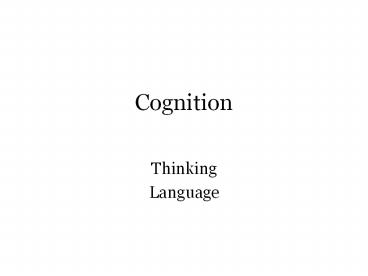Cognition PowerPoint PPT Presentation
1 / 26
Title: Cognition
1
Cognition
- Thinking
- Language
2
Cognition
- Cognition Metacognition
- Concepts
- Problem-Solving
- Obstacles to Problem-Solving
- Cognitive Biases
- Intuition
- Creativity
3
Cognition
- all the mental activities associated with
thinking, knowing, and remembering
4
Metacognition
- thinking about how you think or solve problems
- becoming aware of your own mental processes
5
Concepts
- Mental groupings of similar objects
- Prototype most typical example of a concept
- Organization
- Hierarchies systems in which concepts are
arranged from more general to more specific - Schema preexisting mental frameworks which
enable us to organize and interpret new
information - Scripts are schemas for events
6
Problem-Solving
- Trial and Error trying possible solutions and
discarding those that do not work - Algorithms problem-solving strategies that
involve a slow, step-by-step procedure that
guarantees a solution to many types of problems - Heuristics mental shortcuts or rules of thumb
dont guarantee answers quicker than algorithms
7
Problem-Solving
- Insight sudden and novel realization of the
solution to a problem Aha! moment - Köhlers studies with chimpanzees
- Inductive Reasoning reasoning from specific to
general - Deductive Reasoning reasoning from the general
to the specific - Scientific method really involves using both ways
of thinking
8
Obstacles to Problem-Solving
- Fixation inability to look at a problem from a
fresh perspective - Functional Fixedness failure to use an object in
an unusual way or outside of its typical uses - Mental Set tendency to approach problems in the
same way that has been successful in the past - Framing how an issue is posed can significantly
affect perceptions, decisions, judgments (even
without varying info)
9
Obstacles to Problem-Solving
- Availability Heuristic estimating probability of
certain events in terms of how readily they come
to mind - Representativeness Heuristic new situation is
judged by how well it matches a stereotypical
model or a particular prototype - Anchoring Heuristic/Effecttendency to be
influenced by a suggested reference point,
pulling a response towards that point
10
Cognitive Biases
- Belief Perseverance tendency to hold on to a
belief after the basis for the belief has been
discredited - Belief Bias preexisting beliefs distort logical
reasoning, making illogical conclusions seem
valid or logical conclusions seem invalid - Hindsight Bias tendency to falsely report that
we could have correctly predicted the outcome of
an event
11
Cognitive Biases
- Confirmation Bias tendency to search for and use
information that supports our preconceptions
ignore info that refutes them - Overconfidence Bias tendency to underestimate
the extent to which our judgments are erroneous - overestimate how correct we are
- think we make errors less often than other people
12
Cognitive Biases
- False Consensus Effect tendency for a person to
think his/her own views are representative of a
general consensus
13
Intuition
- Effortless, immediate, automatic feeling or
thought - Enables us to react quickly and adaptively
- Gut reactions without logical thinking
- Does not always help to find the best solution
14
Creativity
- Ability to think about a problem or idea in new
unusual ways, to come up with unconventional
solutions - Convergent Thinking use problem-solving
strategies directed toward one correct solution
to a problem - Divergent Thinking produces many answers to the
same question characteristic of creativity - Brainstorming generating many ideas without
evaluating them
15
Language
- Structure of Language
- Language Development
- Language Acquisition Theories
- Linguistic Relativity Hypothesis
- Brain Language
16
Structure of Language
- Phonemes
- basic sound units
- approx. 100 worldwide
- 42 in the English language
- Morphemes
- smallest meaningful units of speech
- simple words, prefixes, suffixes
17
Structure of Language
- Grammar system of rules that determine how
sounds and words can be combined and used to
communicate meaning - Syntax rules that regulate order for words to be
combined into grammatical sentences - Semantics rules that enables us to derive
meaning from morphemes, words, sentences - Denotation/surface structure (particular words
phrases) - Connotation/deep structure (underlying meaning)
18
Language Development
- Babbling
- Starts about 4 months
- not limited to the phonemes the baby is exposed
to - around 10 months, the baby is limited to familiar
phonemes, demonstrating awareness of home language
19
Language Development
- One-Word Stage
- Starts about 1 year
- speak in holophrases (one word) to convey meaning
- One-word phrases can be actual words or simple
representations of words
20
Language Development
- Two-Word Stage
- Starts at about 2 years
- use telegraphic speech (noun verb)
- Overgeneralization/Overregularization overuse of
grammatical rules when communicating
21
Language Acquisition Theories
- Behaviorism
- B. F. Skinner
- Nurture argument
- Humans learn language through operant
conditioning observational learning
22
Language Acquisition Theories
- Nativist Theory
- Noam Chomsky
- Nature argument
- Humans are born to learn language and have a
natural aptitude for grammar because of a
language acquisition device
23
Language Acquisition Theories
- Statistical Learning Critical Periods
- Babies can learn certain statistical
probabilities in speech - if language ability isnt cultivated before
adolescence, the ability to learn language will
be lost
24
Linguistic Determinism
- Linguistic Relativity/Determinism
- Benjamin Whorf
- Different languages cause people to view the
world differently - Language determines how humans think
- Bilingual people asked the same questions in
different languages may answer differently
depending on which language was used, showing the
influence of language on thinking
25
Brain Language
- Aphasia impaired use of language resulting from
damage to any one of several cortical areas - Brocas Area
- Controls language expression
- Directs muscle movements involved in speech
- Wernickes Area
- Interprets auditory code
- Language comprehension/understanding
26
Brain Language
- Motor cortex enables muscles to pronounce words
- Visual cortex perceives written words
- Angular gyrus transforms visual representations
into auditory code (to be understood by
Wernickes area)

